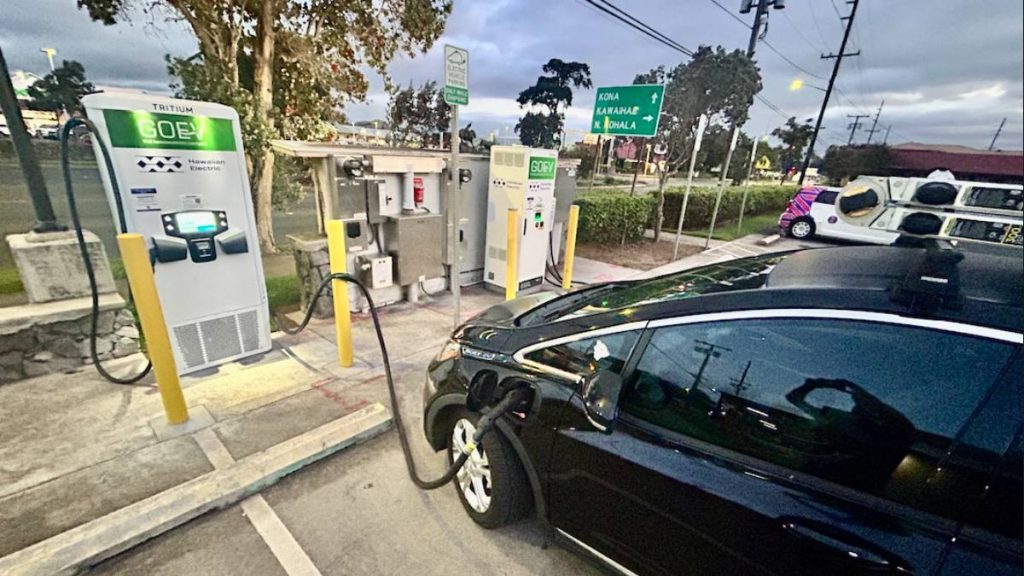Biggest shipping company to Hawaiʻi suspends transport of electric, hybrid vehicles
The largest shipping company that specializes in service to and from Hawaiʻi has suspended new bookings for shipments of used or new electric vehicles and plug-in hybrid vehicles to the islands.
Matson announced the decision in a July 14 letter to customers, citing a fire risk posed by the large lithium-ion batteries used to power the vehicles.

The company said in the letter it plans to resume shipping electric and hybrid vehicles when “appropriate safety solutions that meet our requirements can be implemented.”
There have been no reports of Matson cargo being damaged by a fire caused by lithium-ion batteries, but the U.S. Coast Guard responded to a fire that broke on Morning Midas, a 600-foot Liberian-flagged and U.K.-managed cargo vessel carrying electric and hybrid vehicles about 300 miles south of Adak, Alaska.
Matson’s suspension of electric and hybrid vehicles comes at a time when state leaders are working toward lowering net emissions to zero by 2045. To support this goal, the Hawai‘i Department of Transportation recently announced the first statewide Energy Security and Waste Reduction Plan.
Officials call the new plan a bold roadmap to reduce transportation emissions and expand affordable transportation options for all state residents. Pillars of the plan are island energy security, affordability for kamaʻāina, and emissions reduction.
One of those strategies includes incentives for electric vehicles and cleaner fuels. Read more about the plan here.
As of June 2025, there were 37,767 registered electric vehicles in Hawai‘i, according to the Hawai’i Electric Vehicle Association website.
But Pasha Hawai‘i is continuing to ship electric and hybrid vehicles in a specialized, fully enclosed Pure Car and Truck Carrier called Jean Anne, as well as on its Combination Container/Roll-on Roll-off vessel called Marjorie C.
Jean Anne sails bi-weekly between San Diego, Honolulu, Kahului and Hilo. Marjorie C also sails bi-weekly, from San Diego to Long Beach (where containers are loaded onto the vessel) to Honolulu, returning back to San Diego.
Pasha Hawai‘i coordinates with auto manufacturers, auto dealerships and owners of personal vehicles.
“We fully support the increasing consumer adoption of electric vehicles as part of the state’s commitment to clean energy,” said Pasha Hawaiʻi shipping company spokesperson Laurie LaGrange. “Safety is our number one priority, and we have a number of regulated and proven safeguards in place to ensure our crew and customer cargo are safe.”
Noel Morin, President of the Hawaiʻi EV Association, said it is disappointing that Matson has chosen to suspend shipping the vehicles, but he understands.
Morin said several measures can be taken to prevent fires and promptly address any that may occur. They include requiring that the cars have a partial charge, and deploying heat detection systems and firefighting equipment.
“Compared to gas vehicle fires, the incidence of EV fires is really low,” Morin said. “While very rare, EV fires are challenging to put out without specialized approaches. With these approaches, they are manageable.”
Morin said Matson’s decision to suspend shipping of these vehicles may result in delays of cars to Hawai‘i.
“There is, of course, the possibility of price increases as a result of the reduction in competition,” Morin said. “In the meantime, Pasha has the opportunity to absorb the additional volume.”
Pasha Hawai‘i did not say whether the company would raise shipping prices of these vehicles, with the temporary elimination of competition with Matson .
“I’m hopeful that this decision by Matson is a temporary one and that with their implementation of modern fire/heat detection technology and vehicle fire containment/mitigation strategies, they will resume shipments,” Morin said.
The impact on the state’s energy goals should be minimal, Morin said, adding they still have a long way to go to effect a change in actual carbon and local air pollution.
“Many who drive EVs fully appreciate the benefits of not having to deal with exhaust, not contributing to carbon pollution, and the fact that EVs are super-efficient,” Morin said, explaining that more than 80% of the energy that goes into an EV’s battery is fully utilized.
“With gas cars, up to 80% is wasted as heat,” he said.
Rep. Nicole Lowen has supported legislation that would increase the number of charging stations for vehicles in the state.
Lowen said EVs are a good alternative to fuel vehicles because they provide a big emission reduction from gas to electric.
“They’re cleaner, and I don’t think we have a reliable alternative at this point,” she said. “It would be a shame to have that option cut off.”
Leah Laramee, Climate Change Coordinator with the Hawai‘i Climate Change Mitigation & Adaptation Commission, said shipping disturbances have always been a barrier to life in Hawaiʻi.
“While this may impede EV imports in the short term, we are confident that both EV manufacturers and shipping organizations such as Matson will work together to ensure the safety of their workers and continued shipment of these technologies.”
Laramee said electric vehicles are part of a larger transportation strategy to increase walking, biking, and using traditional transportation methods such as TheBus and Skyline, which all play a role in transitioning to a cleaner, safer and more affordable state.
“Electric vehicles save people money and reduce the emission of harmful chemicals into the atmosphere,” Laramee said.
While supply chain issues have made it challenging for state fleets to convert to 100% electric vehicles, Laramee said there is a goal to convert county light duty fleets in the counties by 2035.



